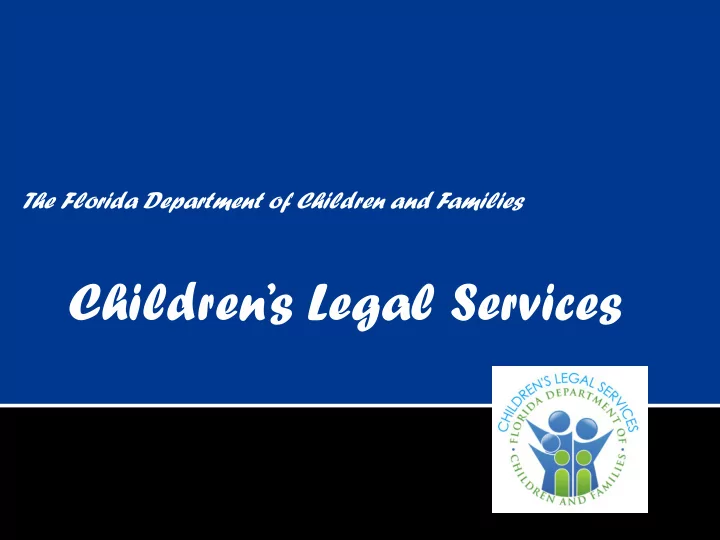

The Florida Department of Children and Families Children’s Legal Services
Child Welfare - Do We All Speak The Same Language? * *Disclaimer: any resemblance to an actual person or case is purely coincidence. Do not take offense if you identify. “Advocating for Dependent Children” 2
Why is this important? “Advocating for Dependent Children” 3
“CLS met with OPA and CBC to identify POC for CPT and SAMH regarding FSDMM, OHC and FSFN.” “Advocating for Dependent Children”
“To effectively communicate, we must realize that we are all different in the way we perceive the world and use this understanding as a guide to our communication with others.” by Anthony Robbins “Advocating for Dependent Children”
Age Gender Education Experience Ethnicity Geography Personality Ego Lack of effective communication is at the base of virtually every misunderstanding. People make assumptions and generalize. “Advocating for Dependent Children”
The Silent Generation – ages 71-88 The Baby Boomers – ages 49-70 Generation X – ages 34-48 Generation Y – The Millenials – ages 13-33 What is next? – under age 13 ▪ Gen Z or the Global Generation “Advocating for Dependent Children”
Communication preferences memos and letters Assets Dedicated Experienced Knowledgeable Challenges uncomfortable with conflict rarely challenge authority “Advocating for Dependent Children”
Communication Preferences In person Assets Team-oriented Dedicated Knowledgeable Challenges May put process ahead of results Not always budget-minded Uncomfortable with conflict “Advocating for Dependent Children”
Communication Preferences Direct, immediate Assets Adaptable Independent Creative Challenges the system Challenges Skeptical Distrusts authority “Advocating for Dependent Children”
Communication Preferences Email Text Assets Optimistic Multi-tasking Technologically savvy Collaborative Challenges Need for structure and supervision Inexperience with difficult interpersonal issues “Advocating for Dependent Children”
Roles in Child Welfare What is your perspective? Attorneys Child Protection Team (CPT) Judges Guardian ad litem (GAL) Case managers Foster parents Relatives Law enforcement Educators Who did I forget? the children!!! “Advocating for Dependent Children” 12
Roles in Child Welfare What is your perspective? Can we make it any more complicated? “Advocating for Dependent Children” 13
Best Interest Statutes Case Law Safety Risk Reasonable person “Advocating for Dependent Children”
Children’s Legal Services CLS - Must follow the law – as interpreted by - Statutes? Case Law? Evidence? Hearsay? Burden of proof? Do we always like the answer? “Advocating for Dependent Children” 15
Children’s Legal Services GAL statutory obligation? Why is this important to know? GAL volunteers – do you know her/his . . . . background education “Advocating for Dependent Children” 16
Children’s Legal Services What about case managers? What about CPT? Procedures Statutes Judges? Foster parents? “Advocating for Dependent Children” 17
Children’s Legal Services Now that we have all this information, what the heck do we do with it? “Advocating for Dependent Children” 18
Be aware of who your audience is Avoid the use acronyms unless you are sure they are part of your listener’s vocabulary “Advocating for Dependent Children”
Attitude and body language Not just words but body language Are your arms crossed Are you really paying attention or looking at your cell phone What is your tone? “Advocating for Dependent Children”
Think before you speak The world does not revolve around you Get rid of the ego You MAY be wrong Open yourself up to suggestions and opinions Think of what is important to that person when conveying your message “Advocating for Dependent Children”
Try to understand their viewpoint Clarify their opinion Ask open ended questions Get rid of your ego “Advocating for Dependent Children”
Your words: “Don’t be ridiculous” “I hope you are happy!” “You have no idea what you are talking about ….” “You have been doing this long enough to know …" “You haven't been doing this long have you?” “Really!” “Advocating for Dependent Children”
Consider these statements: “I am not sure I understand what you are saying” “Can you help me understand?” “How did you come to that conclusion?” “Can you consider my idea/solution?” “How wonderful it is that we are so passionate about these children!” “Advocating for Dependent Children”
Listening Focus fully on the speaker Active listening: repeat back what you heard “I heard you say the child is neglected.” Ask questions “When you say the child is neglected, what do you mean by neglect?” “Advocating for Dependent Children”
Medical Neglect: medical versus legal Emergency: medical versus legal Dirty house “Advocating for Dependent Children”
WHEN AN INCONSISTENCY IS NOT. “Advocating for Dependent Children”
“Advocating for Dependent Children”
NOTE TO TEACHER BY PARENT: Dear Ms. Davis, I want to be very clear on my child’s illustration. It is NOT of me on a dance pole on a stage in a strip joint. I work at Home Depot and had commented to my daughter how much money we made in the recent snowstorm and how we ran out of shovels. I found one that everyone wanted. This photo is of me selling a shovel. Mrs. Harrington “Advocating for Dependent Children”
WHEN AN INCONSISTENCY IS NOT. Exactly same or different question? What were the circumstances of the previous interview? Is it a different detail? Is the child tired and/or not focused? Is the child trying to be a cooperative? Is anyone influencing the child? Ask the child? WHAT IS REALLY GOING ON? “Advocating for Dependent Children”
Don’t forget your power in each child’s life. Don’t forget the child in the child’s life. “Advocating for Dependent Children”
Thank you I know you have a hard job as a foster parent You are appreciated – even though we may not always say it out loud Whenever I think of you, I think you are either all angels and maybe just a little crazy for doing this job You are caring for our most vulnerable population Thank You ! “Advocating for Dependent Children” 32
Recommend
More recommend